Why Mortuary Science is More Than Just a Career—It's a Calling
Mortuary-science combines compassion with technical expertise to serve families during their most difficult moments. This field encompasses the study of deceased bodies, funeral service management, and the art of helping communities process grief and honor life.
Quick Overview: What is Mortuary Science?
- Definition: Study of deceased bodies through mortuary work, preparing students for roles as funeral directors, embalmers, and morticians
- Education: 2-4 year programs covering anatomy, embalming, business management, and grief counseling
- Licensing: National Board Exam + 1-3 year apprenticeship + state licensing requirements
- Salary Range: $26,000-$126,000 annually (average $54,000-$76,000)
- Job Growth: 4% projected growth from 2023-2033
- Key Skills: Empathy, communication, attention to detail, business acumen
The profession has evolved dramatically from its ancient origins. Today's mortuary science professionals blend scientific knowledge with business skills and emotional intelligence.
Modern mortuary science requires mastery of multiple disciplines: embalming chemistry, restorative art, funeral service law, grief counseling, and business management. With over 70% of current students being women, the field is experiencing significant demographic shifts while maintaining its core mission of dignified care.
The career path typically involves completing an accredited mortuary science program, passing the National Board Examination, and serving a supervised apprenticeship. States vary in their specific requirements, but all demand both technical competency and ethical standards.
I'm Mortuary Cooler, a national-level mortuary cooler supplier with experience in the mortuary-science equipment industry. My background includes working directly with funeral homes across the country to provide reliable, durable mortuary solutions that support the essential work of mortuary science professionals.
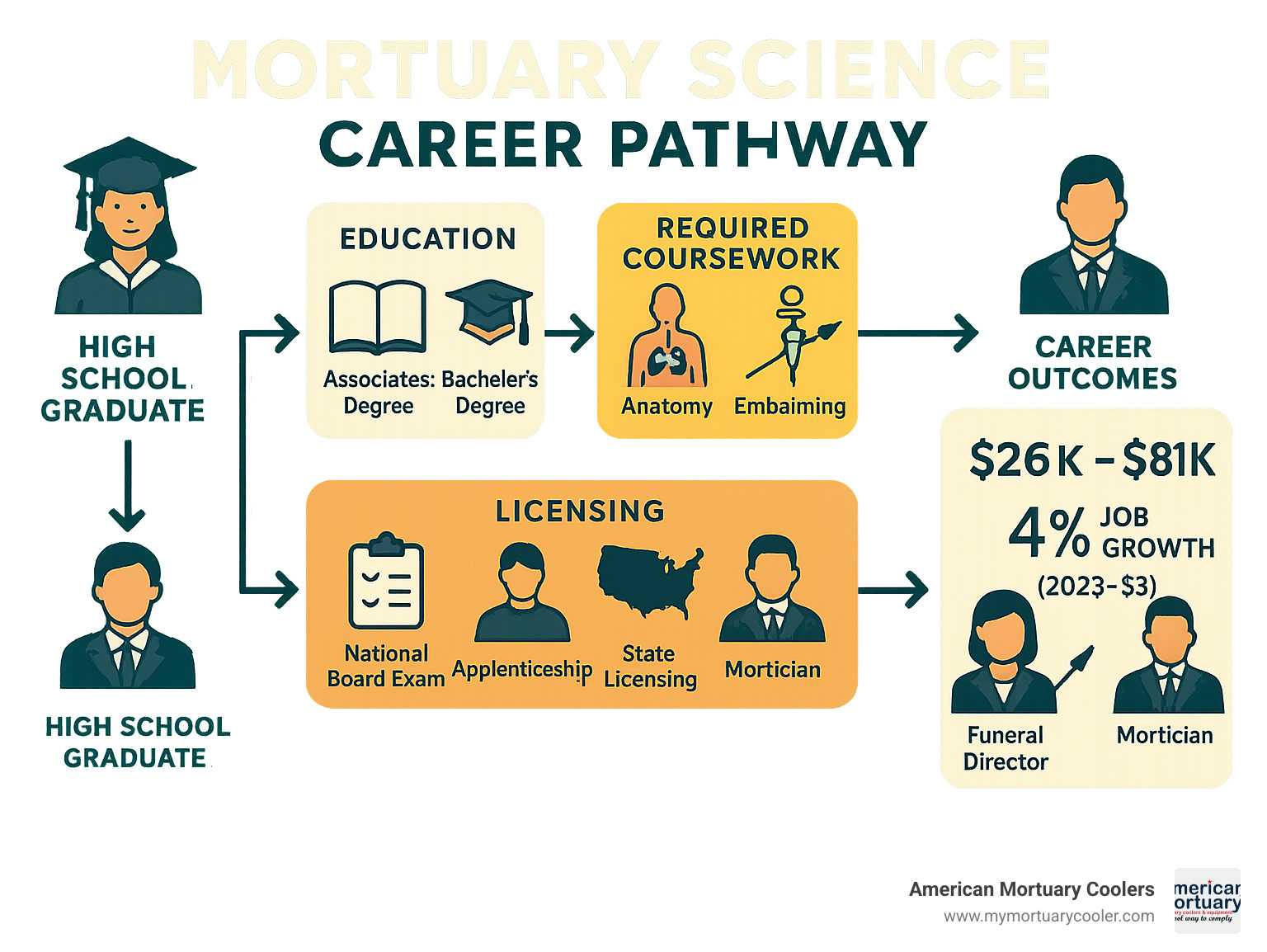
Know your mortuary-science- terms:
Defining mortuary-science- and Its Origins
Mortuary-science- is the study of deceased bodies through mortuary work, preparing students for careers as morticians or funeral directors. Today's mortuary science professionals master everything from body preparation and restoration arts to grief counseling and funeral home business management.
The roots of this profession stretch back over 4,000 years to ancient Egypt. Those early embalmers developed sophisticated preservation techniques that laid the groundwork for everything we do today.
The formal profession as we know it reached its professional peak in the 1950s when funeral directors enjoyed high social status. The term "mortician" was actually adopted in 1895 to distance the profession from negative associations with "undertaker."
Today's funeral industry maintains a unique character. 86% of funeral homes in the United States remain family-owned businesses. Only 14% are owned by corporations, with Service Corporation International holding the largest share at 12% of all funeral homes nationwide.
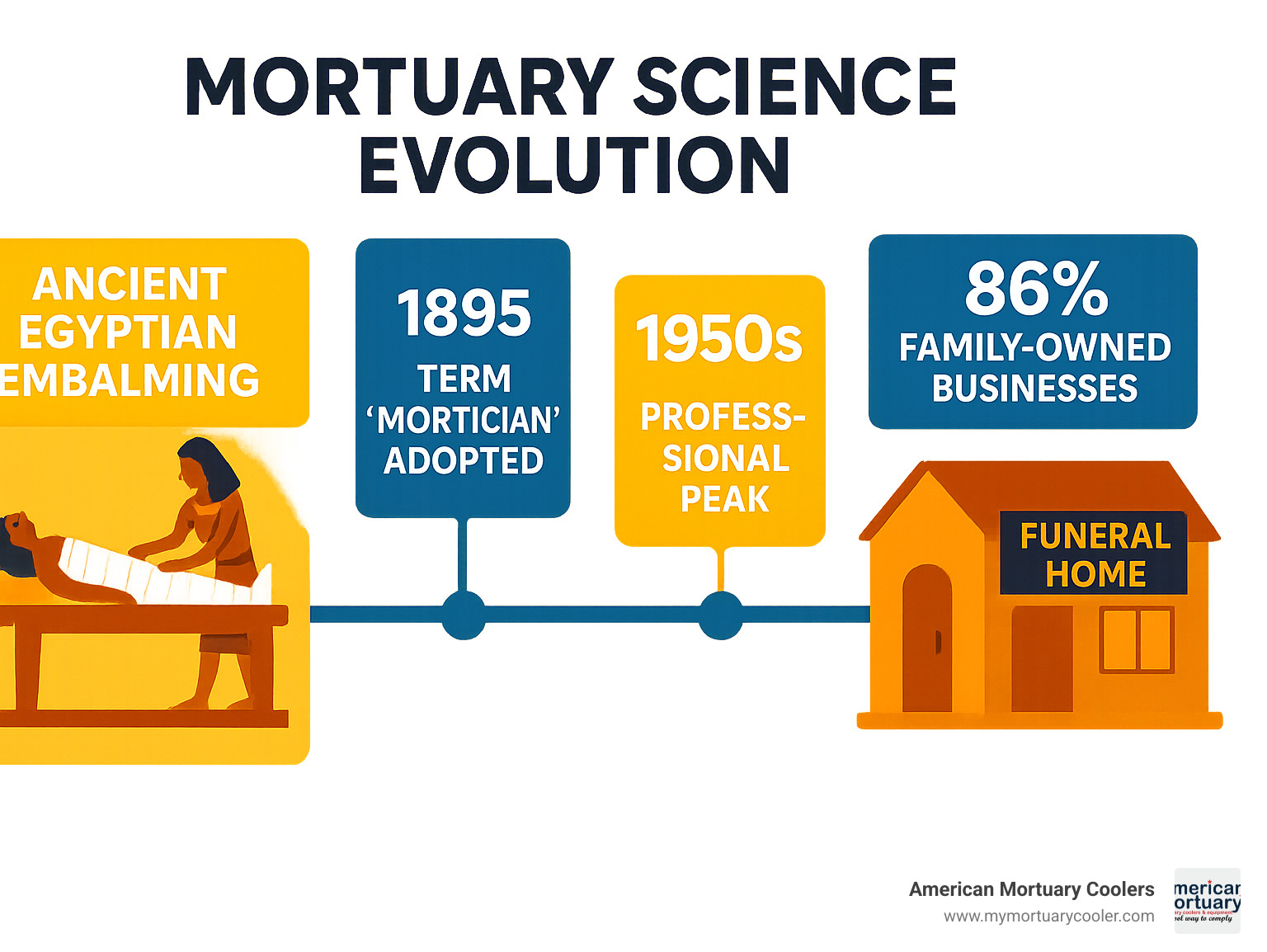
mortuary-science- vs funeral-service: key terminology
Mortuary-science- professionals typically focus on the scientific and technical aspects—body preparation, embalming, and restoration work. Funeral service casts a wider net, encompassing all the services provided to families during their time of loss.
The role overlap is significant in real-world practice. Most modern funeral directors handle both embalming duties and service coordination. The old term "undertaker" has largely disappeared from professional use, replaced by the more dignified "funeral director" or "mortician."
Cultural & Ethical Foundations
Working in mortuary-science- means becoming a cultural translator. Every day, we serve families from different backgrounds, each with specific religious customs and traditions for honoring their loved ones.
Green burials have moved from niche request to mainstream option. Families increasingly ask about environmentally conscious alternatives like natural burial, aquamation, or even human composting.
Legal compliance forms the foundation of everything we do. We steer federal regulations, state laws, and local ordinances covering everything from embalming chemical storage to cemetery operations. Dignity and confidentiality aren't just professional requirements—they're the heart of ethical practice.
Career Paths & Day-to-Day Responsibilities
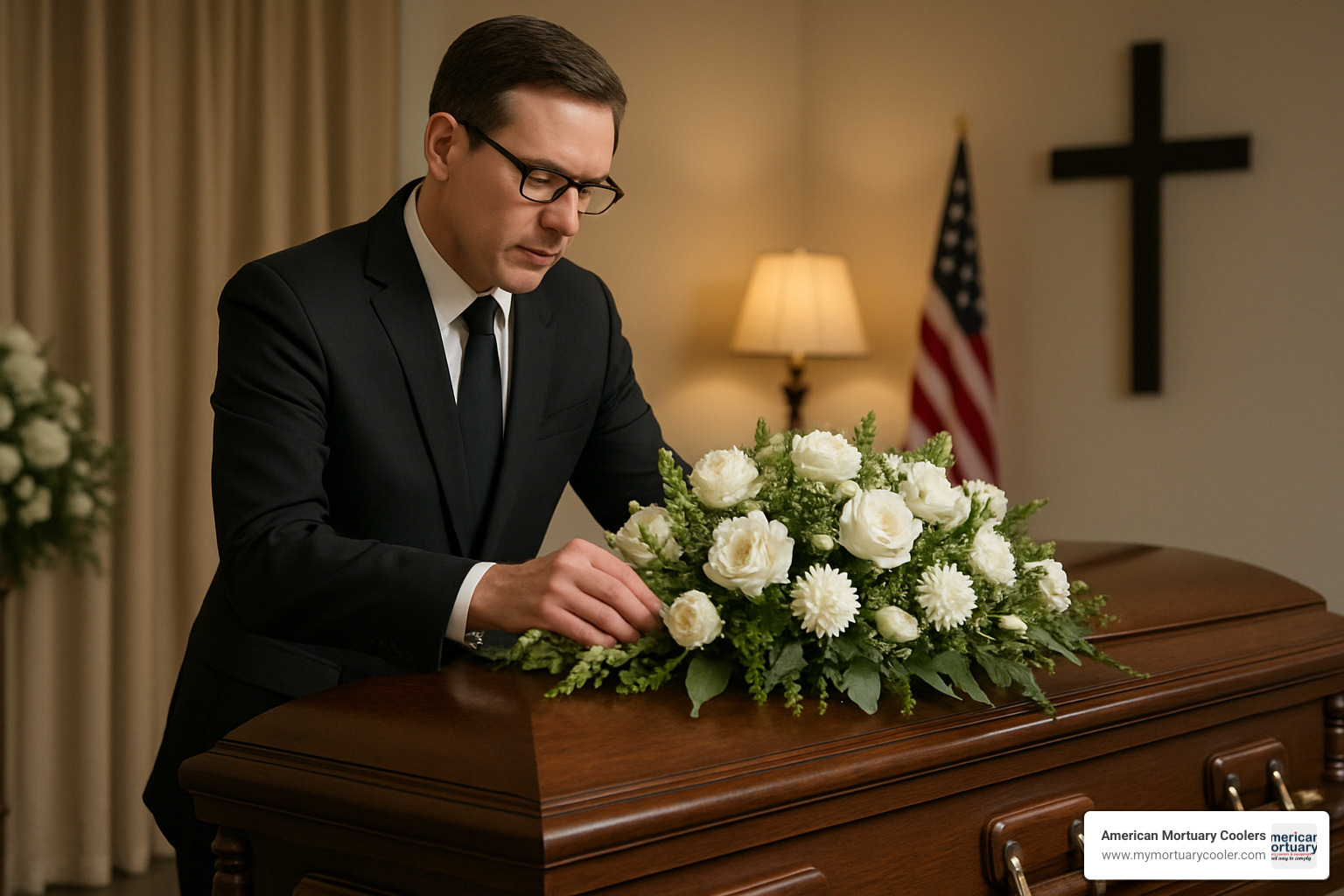
The mortuary-science- field opens doors to several meaningful career paths, each offering unique ways to serve families during their most difficult times.
Funeral directors become the family's main point of contact throughout the entire process. They spend their days meeting with grieving families, helping them steer difficult decisions about services, burial or cremation options, and memorial arrangements.
Embalmers focus on the technical side of body preparation. They work in specialized preparation rooms, carefully preserving and restoring the deceased using chemical solutions and artistic techniques.
Morticians often wear both hats, combining funeral directing and embalming responsibilities. They represent the full-service professional who can handle family consultations in the morning and technical preparation work in the afternoon.
Specialized roles include Restorative artists who focus on cosmetic restoration, Crematory operators who manage cremation processes, Autopsy technicians who work in medical examiner offices, and Grief counselors who provide ongoing emotional support.
Funeral Director, Embalmer, Mortician, Undertaker – what they really do
The daily reality of mortuary-science- work involves countless details that families never see. Funeral directors often start their day reviewing arrangements for upcoming services, then spend hours with families helping them make decisions while managing their own emotions.
Behind the scenes, embalmers work in specialized preparation rooms following strict safety protocols. The embalming process involves making small abdominal incisions, inserting chemical delivery tubes, and carefully suturing everything closed.
Administrative work fills much of the day. Filing death certificates, contacting life insurance companies, arranging Social Security notifications, and coordinating with various vendors creates extensive paperwork.
A Comprehensive Guide to What a Mortician Does
Supporting Families & Communities
Mortuary-science- professionals often become impromptu counselors during families' darkest hours. We provide immediate emotional support and help families understand what comes next.
Memorial planning extends far beyond the traditional funeral service. Modern families want personalized tributes that truly reflect their loved one's life. We help create photo displays, coordinate video memorials, and incorporate meaningful elements like favorite music or hobbies into services.
Pre-planning services have become increasingly popular. Many people prefer making their own arrangements in advance, sparing their families from difficult decisions during grief.
After-care follow-up has become a crucial part of our service. We check in with families weeks or months after services, providing ongoing support and resources.
Education, Licensing & the mortuary-science- Career Ladder
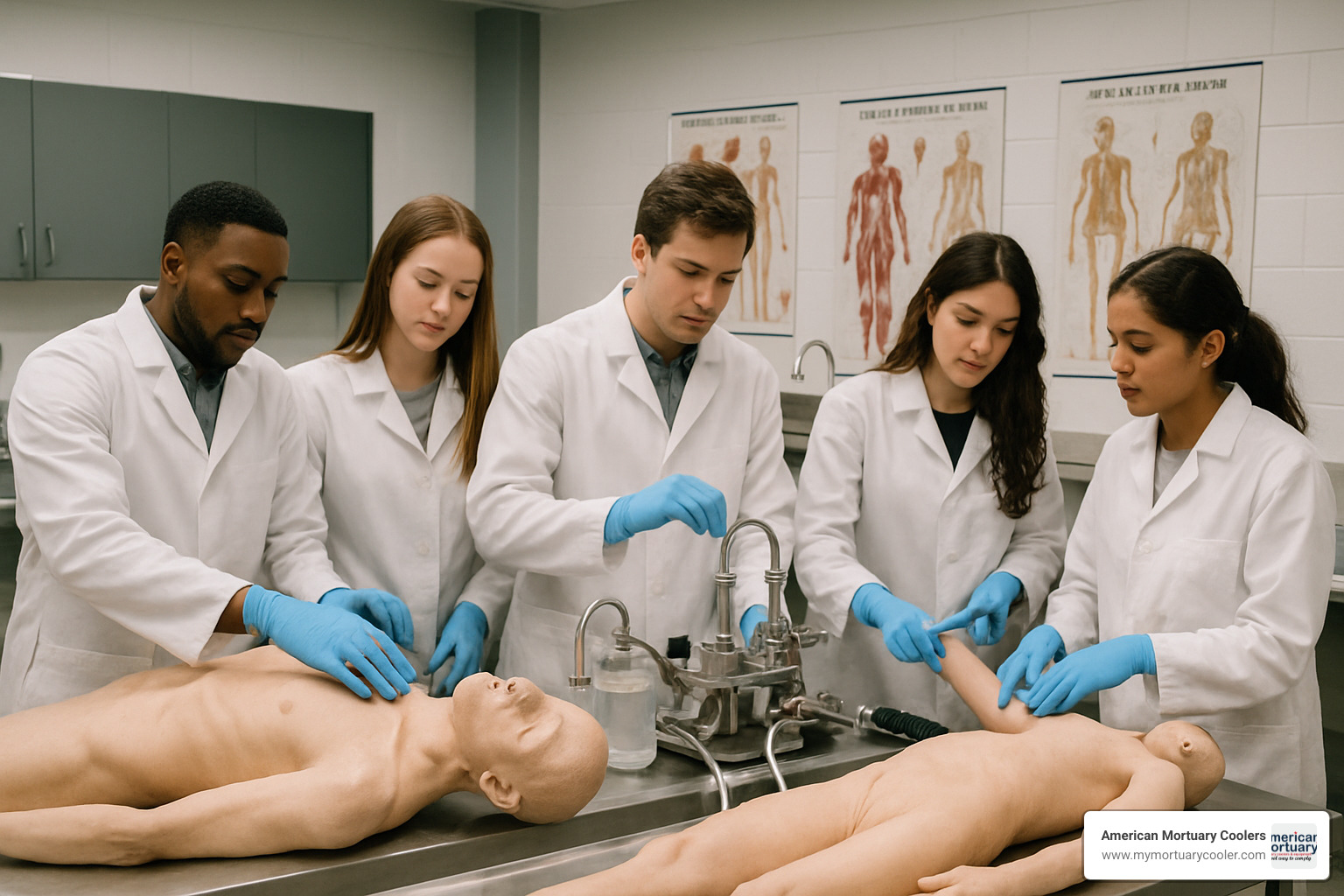
Starting a career in mortuary-science- requires dedication to both academic learning and hands-on training. The American Board of Funeral Service Education (ABFSE) sets the standards for quality education nationwide.
Most mortuary-science- programs offer associate degrees, which typically take two years to complete. The average cost runs around $23,753 for undergraduate programs. Today's students have more flexibility than ever with traditional on-campus programs, online programs, and hybrid programs that combine online theory with supervised practical work.
With over thirty states hosting mortuary-science- programs, you'll likely find options close to home. The National Board Examination represents your final academic hurdle, requiring at least 75% on both arts and science sections.
American Board of Funeral Service Education
Admission Requirements & Core Coursework
Getting into a mortuary-science- program requires a high school diploma or GED, and most schools require you to be between 18-21 years old. Some programs ask for additional items like a driver's license, background check, or health clearance.
The curriculum balances scientific knowledge with practical skills and business training. Your science courses will include human anatomy, physiology, pathology, microbiology, and thanato-chemistry. You'll master embalming theory and practice, learn restorative art techniques, and understand proper protocols for handling infectious materials.
Business and legal training prepares you for the entrepreneurial side of the profession. Courses cover funeral service management, accounting, funeral service law, and merchandising.
Communication and counseling courses teach the "soft skills" that families desperately need during their darkest hours. Laboratory work provides hands-on experience with real procedures under strict ethical guidelines.
Mortuary Science Education 101
mortuary-science- career ladder: from student to licensed professional
After completing your academic coursework, you'll secure an apprenticeship or internship position with a licensed funeral director who becomes your mentor and guide.
Apprenticeship requirements vary dramatically by state—some require just one year of supervised experience, while others mandate three full years. Connecticut requires aspiring morticians to assist in at least 50 embalming operations before licensure.
Career advancement opportunities abound for motivated professionals. You might progress to funeral home management, pursue corporate positions with large funeral service companies, or launch your own business.
| Program Type | Duration | Requirements | Typical Cost |
|---|---|---|---|
| Associate Degree | 2 years | High school diploma, age requirements | $23,753 average |
| Bachelor's Degree | 4 years | High school diploma, prerequisites | Higher tuition |
| Certificate/Diploma | 1-2 years | Varies by state | Lower cost option |
Risks, Rewards & Essential Skills
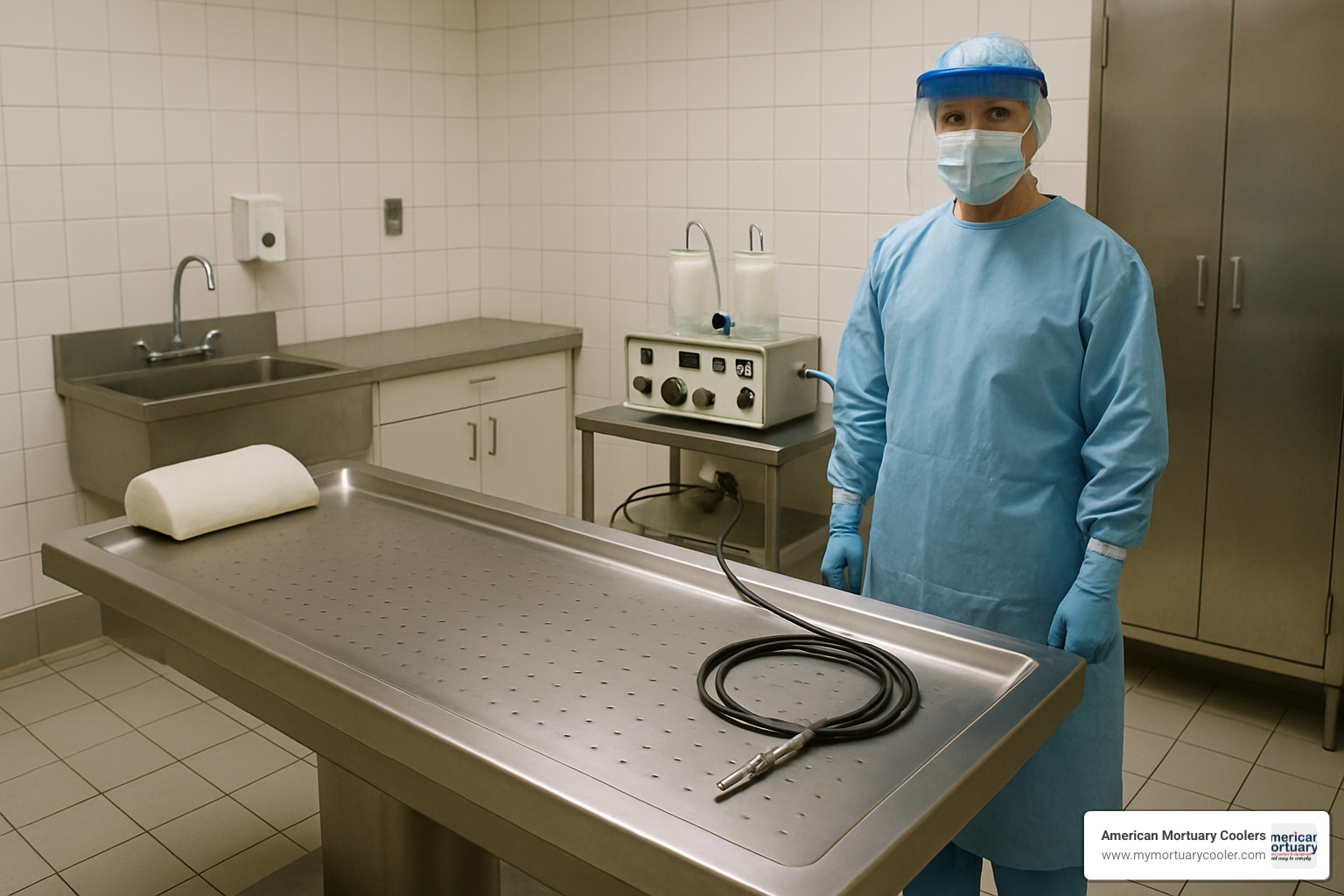
Mortuary-science- comes with real challenges that you need to understand before committing to this career path. The health risks are real and require serious attention. Formaldehyde exposure is probably the biggest concern you'll face. You'll also potentially encounter infectious diseases, though proper protocols significantly reduce this risk.
The physical demands might surprise you. Bodies are heavy, and you'll spend considerable time on your feet. Emotionally, this work can be draining. You're surrounded by death and grief every day. The schedule rarely follows normal business hours.
But here's what makes it worthwhile—the profound satisfaction of helping families through their darkest hours. When a mother thanks you for making her son look peaceful, you realize you're doing something that truly matters.
The essential skills for success go far beyond technical training. Empathy tops the list—you need genuine care for people without letting their pain overwhelm you. Communication skills are crucial since you're constantly explaining procedures and providing emotional support.
Attention to detail can't be overstated. A mistake affects real families during vulnerable times. Business skills are increasingly important too. Artistic ability helps with cosmetic restoration work.
X Essential Skills to Become a Mortuary Jobs Professional
Health & Safety Challenges
OSHA standards aren't just bureaucratic requirements—they're your lifeline in this profession. Proper ventilation systems in preparation rooms are absolutely critical for minimizing chemical exposure.
Personal protective equipment isn't optional. Gloves, eye protection, and respiratory equipment when needed should become second nature. Sharps protocols protect against cuts from surgical instruments. Stress management resources are finally getting the attention they deserve in our industry.
Personal Qualities for Success
Resilience might be the most important quality you can develop. You'll witness human tragedy regularly, yet you need to maintain emotional stability to serve families effectively.
Cultural sensitivity becomes more important every year as communities become increasingly diverse. Problem-solving skills will save you countless headaches when unexpected situations arise. Public-speaking confidence helps more than you might expect, as you'll often address families during arrangements and coordinate with clergy during services.
Job Outlook, Salary & Professional Development
The mortuary-science- profession offers something rare in today's job market: stability and meaning combined with solid earning potential.
The Bureau of Labor Statistics projects 4% growth from 2023 to 2033 for funeral service workers, with approximately 7,900 annual openings expected over the next decade.
Salary ranges vary dramatically based on your role, experience, and location. Funeral home managers earn a median of $76,000 per year, with some states reporting salaries as high as $134,000. The average funeral service worker makes over $54,000 annually, though new graduates might start anywhere from $26,000 to $126,000.
Geography makes a huge difference in earning potential. Minnesota morticians average $40.38 per hour ($83,990 per year), while Puerto Rico averages just $11.65 per hour ($24,230 per year).
The profession is experiencing a fascinating demographic shift. Over 70% of current mortuary science students are women, completely changing what was once a male-dominated field.
Entrepreneurship opportunities remain strong for ambitious professionals. Twenty percent of funeral businesses are individually owned by morticians. Scholarship opportunities specifically target veterans, members of professional associations, and students from underrepresented communities.
Bureau of Labor Statistics funeral occupations Mortuary Science Salary 101
Emerging Trends: Green Burial & Digital Memorials
Modern mortuary-science- professionals must stay ahead of changing consumer preferences. The green burial movement is gaining momentum, with families increasingly requesting environmentally conscious options like aquamation (water cremation) and human composting.
Digital technology has revolutionized how we serve families. Livestream funeral services allow distant relatives to participate in ceremonies, while online guest books and virtual grief support groups extend our reach beyond physical locations.
Lifelong Learning & Certifications
Continuing education isn't just a requirement—it's essential for staying current in an evolving profession. Most states require 10-20 hours of approved coursework every 1-2 years to maintain licensure.
Specialized certifications can significantly boost your career prospects. Crematory Operator certification allows you to manage cremation operations independently, while Pre-planning Consultant certification focuses on advance funeral planning sales and counseling.
Professional associations provide ongoing education through conferences, workshops, and publications. The National Funeral Directors Association (NFDA) and American Society of Embalmers (ASE) offer resources custom to different professional focuses.
Frequently Asked Questions about Mortuary Science
When considering a career in mortuary-science-, prospective students often have practical questions about the path ahead. Let me address the most common concerns I hear from students exploring this meaningful profession.
What exams do I need to pass to become licensed?
The journey to licensure involves three distinct examinations, each serving a specific purpose in ensuring professional competency. Think of these as building blocks that demonstrate your readiness to serve families during their most vulnerable moments.
The National Board Examination comes first, administered by the American Board of Funeral Service Education. This comprehensive test covers everything you've learned in school—anatomy, embalming procedures, funeral service management, and grief counseling principles. You'll need to score at least 75% on both the arts and science sections. Many students find the science portion challenging, particularly the anatomy and embalming chemistry components.
Your State Board Examination focuses on local requirements that vary significantly across the country. While the National Board tests universal knowledge, state exams cover specific laws, regulations, and practices unique to where you plan to work. For example, California's requirements differ substantially from those in Texas or New York.
The Laws, Rules, and Regulations exam ensures you understand your legal boundaries and obligations. This test covers everything from proper handling of death certificates to consumer protection laws that govern funeral service pricing and disclosure requirements.
How long is an apprenticeship and can I start before graduation?
Apprenticeship duration varies dramatically depending on where you plan to practice. Most states require one to three years of supervised experience before granting full licensure, though some allow shorter periods for candidates with bachelor's degrees.
The timing question is crucial for planning your education and finances. Some states permit students to begin apprenticeships during their final semester, allowing you to earn while completing your degree. Others require full graduation before starting supervised practice.
During your apprenticeship, you'll work under a licensed funeral director or embalmer who guides your practical learning. Connecticut requires participation in at least 50 embalming operations, while other states focus more on the total hours of supervised experience rather than specific procedure counts.
This hands-on training period bridges the gap between classroom theory and real-world practice. You'll handle actual family situations, learn facility management, and develop the emotional resilience necessary for long-term success. Most apprentices receive modest salaries during this period, helping offset the financial challenges of extended training.
Are there accredited online mortuary-science programs?
Online mortuary-science- education has evolved significantly, offering genuine flexibility for students who need to balance education with work or family responsibilities. Several accredited institutions now provide distance learning options, though the hands-on nature of our profession means you can't complete everything from your computer.
Hybrid programs represent the most practical approach for many students. You'll complete theoretical coursework—anatomy, funeral service law, grief counseling, and business management—through online platforms while arranging for laboratory and clinical experiences at approved facilities.
The practical components simply cannot be taught virtually. Embalming procedures, restorative art techniques, and equipment operation require hands-on training with proper supervision. Most online programs address this through intensive weekend sessions, summer residencies, or partnerships with local funeral homes for supervised practice.
These programs work particularly well for students in rural areas where traditional mortuary schools aren't accessible, or for career changers who need to maintain current employment while transitioning to funeral service. The flexibility comes with the responsibility of self-discipline and strong time management skills.
Before enrolling in any program, verify its accreditation status with the American Board of Funeral Service Education. Your state licensing board will only accept degrees from properly accredited institutions, making this verification essential for your career plans.
Conclusion
Mortuary-science- offers something truly special—a career where scientific knowledge meets genuine compassion. This isn't just another job; it's a profession that lets you serve families when they need support most, while building a stable and rewarding future for yourself.
The field keeps growing and changing in exciting ways. Today's professionals work with everything from traditional burial services to eco-friendly options like aquamation. They livestream memorial services for distant relatives and use new technologies to help families heal.
Success in mortuary-science- requires heart as much as skill. You'll need genuine empathy to comfort grieving families, strong communication abilities to guide them through difficult decisions, and the emotional strength to handle loss every day.
The path to becoming licensed is straightforward but thorough. You'll complete an accredited program, pass your exams, and work under experienced mentors during your apprenticeship. Financial aid and scholarships help make education affordable, and with over 30 states offering programs, you can likely find training close to home.
The numbers speak for themselves: 4% job growth through 2033, median salaries around $54,000-$76,000, and excellent opportunities for entrepreneurship. With 20% of funeral businesses owned by individual morticians, you could even build your own family enterprise someday.
At American Mortuary Coolers, we've spent years supporting mortuary-science- professionals across the country. From our Tennessee facility, we design and build custom mortuary coolers that funeral homes depend on every single day. We understand that reliable equipment isn't just important—it's essential for maintaining the dignity and respect that families deserve.
Your equipment needs to work perfectly, every time. That's why we focus on durability and precision in every cooler we craft. Our direct delivery service reaches funeral homes in all 48 contiguous states, because we know that when you need equipment, you need it fast and you need it right.
Whether you're just starting to explore this career or you're already working in the field, mortuary-science- offers something rare: the chance to make a real difference in people's lives while building a meaningful career for yourself.





















